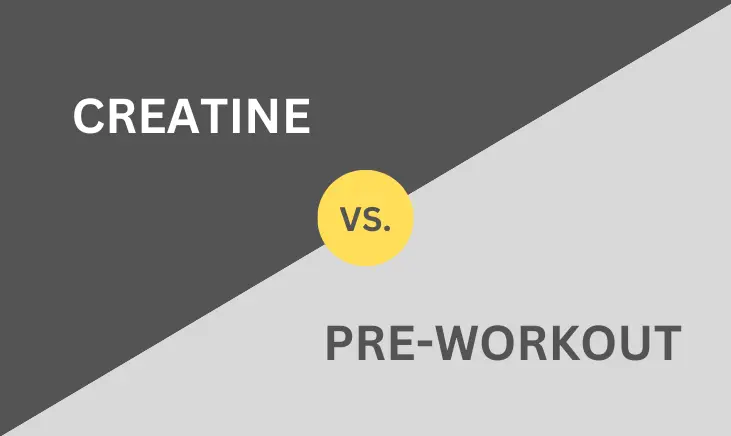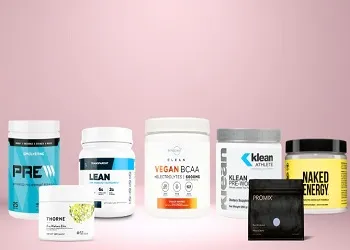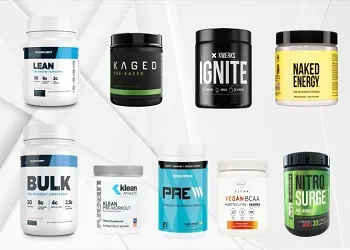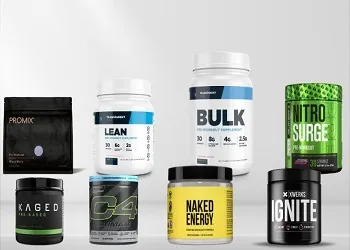Table of Contents
Creatine Vs Pre-Workout: Key Takeaways
- Not every ingredient in pre-workout has as much evidence backing its safety and efficacy as creatine.
- Creatine and pre-workout differ in benefits, timing, dosage, side effects, and cost.
- You can certainly take both, but you’ll need to take a closer look at the ingredient lists to ensure you take the right doses.
- Many pre-workouts contain creatine, but it may not be in high enough doses to see results. So, this is an instance to supplement with both.
- If I had to choose between the two, it would be creatine. Hopefully, this article explains why.
What’s the Difference Between Pre-Workout and Creatine?
Pre-workout typically contains a vast array of ingredients, whereas creatine is a single compound that can be taken on its own or in conjunction with other supplements. Creatine is a common ingredient in many pre-workout formulas as an ergogenic aid.
Can You Mix Creatine With Pre Workout?
As mentioned, many pre-workout supplements include creatine in the ingredient lineup, but if it doesn’t contain the appropriate dose for you, you may consider using a creatine supplement as well. The recommended dose for creatine is 3-5 grams (the exact amount is based on body weight). So, if the pre-workout supplement contains less than that, you may want to mix creatine into the pre-workout.
They aren’t the same by any means, but they do provide similar benefits, so it may not be necessary to double up if you are trying to choose between the two or have a limited supplement budget.
What is Creatine and What Does It Do?
Creatine is an amino acid naturally produced by the body, but it isn’t used to assemble proteins. Rather, it is used to generate adenosine triphosphate (ATP). This is important in the fitness world because ATP is what the body uses for energy, particularly short, explosive movements.
Creatine monohydrate is the most commonly used form of creatine. It is also well-researched, inexpensive, and safe according to sports science research. Creatine supplements come in the form of powder, capsules, and creatine gummies.
Benefits of Creatine

Muscle Growth & Strength: A more constant supply of energy from increased ATP production theoretically means individuals can train harder and longer. When combined with resistance training, creatine can help improve muscle strength. However, it isn’t just theory. Many studies have demonstrated that consistent creatine supplementation leads to increased lean muscle mass. Additionally, creatine aids in muscle recovery, which in the longer term, can lead to muscle growth.
Cognition: Creatine supplementation has even been linked to improved brain health and cognition like enhancing working memory and slowing cognitive decline in elderly individuals.
Vegans & Vegetarians: Lastly, supplementing with creatine is especially beneficial for vegans and vegetarians as non-meat eaters tend to have lower baseline intramuscular creatine stores than meat eaters.
What is Pre-Workout and What Does It Do?
Pre-workout is a category of supplements. It’s a term for a formula of ingredients purported to improve workout performance. Many pre-workout supplements have a couple of different purposes.
One brand’s pre-workout formula will not be the same as another, so it’s important to understand what goes into a pre-workout supplement and decide which ingredients you’d like to prioritize.
I have to mention that pre-workout nutrition should be the primary mechanism to power your workout. Carbohydrates are the most important thing here, and some protein and minimal fat and fiber (for digestive purposes) will fuel your body for the work ahead. If you have properly fueled with food first, mix your pre-workout into smoothies, water, or any other liquid to chug before you hit the gym.
The specific ingredients and their quantities can vary widely between brands and products, but many pre-workouts share common ingredients that are believed to boost physical and mental energy, increase blood flow, and enhance muscular endurance.
Pre-workout is one of the supplements that fitness enthusiasts swear by, and for good reason. Most reputable brands contain adequate doses of well-regarded ingredients shown to improve athletic performance. The most common pre-workout ingredients in pre-workout formulas and their function are:
Caffeine: It most often appears on labels in the form of caffeine anhydrous. Caffeine in pre-workout—just like the one we’re familiar with— increases alertness and focus, decreases reaction time, lowers fatigue, and increases pain threshold. The ISSN recommended dose is 3-6 grams. For regular coffee drinkers, 4-6 grams may be best. 2-3 grams per serving is probably enough for beginners.
Beta-Alanine: This amino acid doesn’t help build proteins; it combines with histidine to make carnosine. Carnosine is supposed to increase muscular endurance and lower the time to exhaustion. Even though many pre-workouts contain only 1-2 grams, the adequate dose for beta-alanine is six grams per day to build up carnosine in the muscles. It should just be divided into four separate doses.
Creatine: Creatine, as we know, provides energy specifically for high-intensity activity and shorter aerobic activities. It also increases the uptake of nutrients and improves muscle recovery.
Nitric Oxide Precursors (vasodilators): Specific precursors you may find on a pre-workout label are L-arginine, L-citrulline, and beetroot juice. Vasodilation means that blood vessels expand and increase blood flow to the muscles. This is the “pump” associated with pre-workout that allows you to work harder.
Branched-chain Amino Acids (BCAAs): BCAAs are four essential amino acids that have a “branched” structure. Recent research indicates that BCAAs may not be as beneficial as just using either an amino acid supplement or protein powder.
Electrolytes: When it comes to hydration, the most notable electrolytes are sodium, potassium, magnesium, and chloride. It’s great that these are in pre-workout to keep you adequately hydrated throughout your workout.
Nootropics: Nootropics are fairly new to the supplement game and are often sold at a premium. They are purported to increase cognitive function. Some contain caffeine and some don’t.
Carbohydrates: Carbohydrates are a necessity when it comes to having sustained energy to power through your workout or sport.
Benefits of Pre-Workout
Listed above are common pre-workout ingredients that come with their own sets of benefits. It’s an all-in-one solution to combine the benefits of many supplements. Some even work synergistically with others to maximize effects.
Many users are big fans of pre-workout because of the focus, alertness, and energy they get before their workout. This mental focus and increased blood flow help them improve exercise performance.
Does Creatine Work as a Pre Workout?
You won’t experience the same effects from just taking creatine instead of a pre-workout with creatine. The main difference is the caffeine and other nootropic components in many pre-workouts that enhance focus. If this matters to you, consider drinking coffee in addition to your creatine supplement before a workout, or look into nootropics if that is something you are interested in.
Creatine can work as a pre-workout for an energy boost, but it can also be taken at any time or after your workout to aid in muscle recovery, as long as it is taken consistently.
Creatine Vs. Pre-Workout: Timing & Dose

How Much Pre-Workout Should I Take? (Pre-Workout Dosage)
Multi-ingredient pre-workout supplements (MIPS) will have ingredients in different doses, making it impossible to land on an accurate pre-workout dose. Most importantly, follow the specific brand’s dosing guidelines and never take more than the instructions specify.
As previously mentioned, an adequate dose of beta-alanine, one of the most common pre-workout ingredients, is about 6 grams to be taken in four separate doses. This can be a real hassle for some just looking to take one supplement serving per day.
If you’re experiencing unpleasant side effects, consider breaking up the dose into two smaller doses taken at separate times during the day. It may not elicit the same instant effects like focus and pump before a workout, but you’ll still get all the other benefits in their entirety
Pre-workout acts fast, so it should be taken 15-30 minutes before a workout for optimal results. It’s important to be mindful of the caffeine content in many pre-workouts to avoid taking it too close to sleep. One thing that can derail your fitness goals is a lack of quality sleep. Timing with creatine doesn’t matter as much as long as it is taken daily.
How Much Creatine Should I Take? (Creatine Dosage)
To reap the benefits of creatine, it needs to be taken regularly to maximize muscle creatine stores. This can be done with a loading phase or without one; it comes down to your anticipated timeframe. This either requires a 5-7 day creatine loading phase or a month of 3-5 gram daily doses.
A creatine loading phase is calculated using body weight in kilograms multiplied by 0.3. This number is the total amount of creatine to take for 5-7 days, depending on what you feel like. Results have been seen after 5 days, but doing 2 extra days of loading doses will not cause harm if you aren’t experiencing side effects. After the loading phase, your muscles should be saturated, and you can start to enjoy the benefits of taking creatine.
Creatine Vs. Pre-Workout: Side Effects
As with most dietary supplements, creatine and pre-workout come with a few side effects that you may want to consider when deciding on your supplement routine.
Creatine
Creatine monohydrate is considered as one of the safest and most effective ergogenic aids, but some potential side effects are:
Increased thirst: This is usually due to water retention.
Weight gain: This is also a temporary side effect that may happen from water retention as well.
There are other misconceptions about creatine like that it may cause dehydration, muscle cramps, and kidney damage; these side effects have been disproven in modern research.
Pre-Workout
Pre-workout also has side effects to consider before adding to your supplement rotation.
Tingling or itchy sensation: This is known as paresthesia from beta-alanine. Tingling normally affects the face, ears, neck, and upper extremities.
Increased sweating: Sweating may be due to caffeine and other thermogenic ingredients.
Stimulant Effects: Caffeine is a stimulant that can cause jitteriness, anxiousness, and trouble sleeping.
Digestive Issues: Many supplements have the potential to create stomach upset. In pre-workout particularly, sodium bicarbonate, magnesium, and caffeine may be to blame.
Face Flushing: This is likely due to the niacin found in many pre-workouts.
Headaches: Vasodilators like citrulline can lead to blood pressure changes and instigate a headache.
Some pre-workouts contain additives or proprietary blends where you don’t know exactly what’s in the supplement and in what amounts; sometimes can cause unanticipated side effects.
Creatine Vs. Pre-Workout: Cost
A creatine monohydrate supplement will be cheaper than most pre-workout supplements. A lot more goes into forming a pre-workout powder, whereas creatine is what it is. You get more varied benefits from a pre-workout because it includes several other ingredients.
If we’re talking averages, most pre-workout powders range from $30-$50 for 30 servings. Presumably, this will last you about a month if you’re taking it every day. Creatine on the other hand will be about $20-$40 for 100 servings which will last about three months.
You can compare it to paying a bit more for a taco spice blend compared to just buying cumin. The spice blend has already been measured out with other ingredients including cumin, but with some additional seasonings with their roles to play in the recipe. If you want to DIY your spices for tacos, you can just use cumin and the stuff you already have in your pantry, or you can buy the other desired spices at the store to simulate the pre-bought taco spice blend. The individual spices will probably be better value, but it depends on what you’re after.
Wrapping Up
Creatine and pre-workout supplements serve different primary functions. Creatine, a single compound, focuses on energy generation essential for short, explosive movements and muscle recovery, while pre-workouts are blends designed to enhance physical and mental energy, blood flow, and muscular endurance.
While many pre-workouts contain creatine, the doses often fall short of the optimal amount, leading some users to supplement with both. When used, creatine can be consumed at any time, whereas pre-workouts should be taken before exercise. Side effects of creatine are generally minimal and include increased thirst and temporary weight gain, while pre-workouts can lead to sensations like tingling, digestive issues, and stimulant-related effects.
In terms of cost, creatine is more affordable. Overall, both offer distinct advantages, but creatine is frequently favored for its broad, evidence-backed benefits. When considering both, it’s crucial to examine ingredient lists and dosages to ensure effective and safe supplementation.
Frequently Asked Questions
What should a woman take before a workout?
It’s important to focus on food first, which should include carbohydrates, some protein, and minimal fat and fiber before a workout. A toasted bagel with a little peanut butter and jam would suffice. Some find caffeine to be a helpful pre-workout aid.
What supplements should a man take before a workout?
This is the same as it is for women—it’s best to focus on food first. Then, a pre-workout powder may be helpful for some.
Which is better: Creatine or Pre-workout?
It depends on your goals. Based on the research, timing, dosage, side effects, and cost, creatine appears to be the superior supplement.
References
Antonio, J., Candow, D. G., Forbes, S. C., Gualano, B., Jagim, A. R., Kreider, R. B., Rawson, E. S., Smith-Ryan, A. E., VanDusseldorp, T. A., Willoughby, D. S., & Ziegenfuss, T. N. (2021). Common Questions and Misconceptions about Creatine supplementation: What Does the Scientific Evidence Really show? Journal of the International Society of Sports Nutrition, 18(1). https://doi.org/10.1186/s12970-021-00412-w
Buford, T. W., Kreider, R. B., Stout, J. R., Greenwood, M., Campbell, B., Spano, M., Ziegenfuss, T., Lopez, H., Landis, J., & Antonio, J. (2007). International Society of Sports Nutrition position stand: creatine supplementation and exercise. Journal of the International Society of Sports Nutrition, 4(1), 6. https://doi.org/10.1186/1550-2783-4-6
Candow, D. G., Forbes, S. C., Ostojic, S. M., Konstantinos Prokopidis, Stock, M. S., Harmon, K. K., & Faulkner, P. (2023). “Heads Up” for Creatine Supplementation and its Potential Applications for Brain Health and Function. Sports Medicine. https://doi.org/10.1007/s40279-023-01870-9
Guest, N. S., VanDusseldorp, T. A., Nelson, M. T., Grgic, J., Schoenfeld, B. J., Jenkins, N. D. M., Arent, S. M., Antonio, J., Stout, J. R., Trexler, E. T., Smith-Ryan, A. E., Goldstein, E. R., Kalman, D. S., & Campbell, B. I. (2021). International society of sports nutrition position stand: caffeine and exercise performance. Journal of the International Society of Sports Nutrition, 18(1). https://doi.org/10.1186/s12970-020-00383-4
Trexler, E. T., Smith-Ryan, A. E., Stout, J. R., Hoffman, J. R., Wilborn, C. D., Sale, C., Kreider, R. B., Jäger, R., Earnest, C. P., Bannock, L., Campbell, B., Kalman, D., Ziegenfuss, T. N., & Antonio, J. (2015). International society of sports nutrition position stand: Beta-Alanine. Journal of the International Society of Sports Nutrition, 12(1). https://doi.org/10.1186/s12970-015-0090-y
Wolfe, R. R. (2017). Branched-chain amino acids and muscle protein synthesis in humans: myth or reality? Journal of the International Society of Sports Nutrition, 14(1). https://doi.org/10.1186/s12970-017-0184-9
Wu, S.-H., Chen, K.-L., Hsu, C., Chen, H.-C., Chen, J.-Y., Yu, S.-Y., & Shiu, Y.-J. (2022). Creatine Supplementation for Muscle Growth: A Scoping Review of Randomized Clinical Trials from 2012 to 2021. Nutrients, 14(6), 1255. https://doi.org/10.3390/nu14061255














